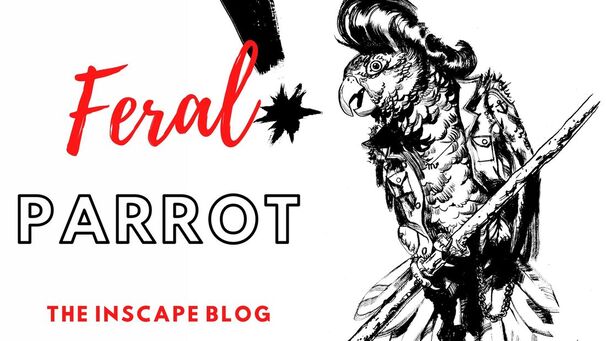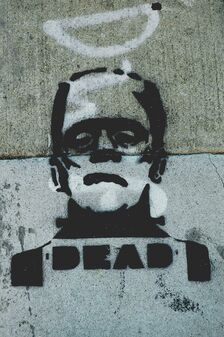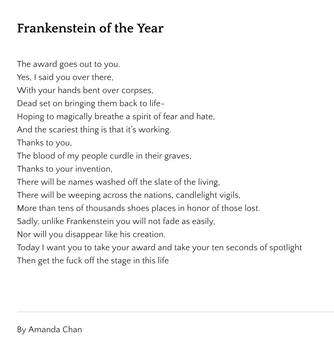- Folio No. 9
- About
- Feral Parrot : The Blog
- INTERVIEWS
- SUBMISSIONS
-
ISSUE ARCHIVE
- PRINT Chapbook No.6 Healing Arts
- Online Issue No.9
- Online Issue No.1 Fall 2016
- Online Issue No.2 Spring 2017
- ONLINE Issue No.3 Fall 2017
- PRINT Vol 72 No 2 Fall 2017
- PRINT Vol 73 No.1 Fall 2018
- ONLINE Issue No. 4 Fall 2018
- Online Issue No.5 Summer 2018
- FOLIO No.1 Fall 2018 VOTE
- ONLINE Issue No.6 Fall 2018 Fall Spirituality
- FOLIO 2 Fall 2019 Celebrating Dia De Los Muertos
- FOLIO No.3 -- Moon Moon Spring 2019
- FOLIO No.4 Celebrating New PCC Writers
- FOLIO No.5 City of Redemption
- FOLIO No.6 Spring 2020
- FOLIO No. 7 - Winter 2021 Into the Forest
- 2022 Handley Awards
- Inscape Alumni Board
- PRINT Chapbook No. 7 Healing Arts
- Blog
- Untitled
Written by Andrew ZapataAre we all just naturally hateful? Or is the sense of hate instilled in us by someone or something? Throughout history various dictatorships have been held around the world - each one leaving its people robbed, broken, and resentful. Hate and fear are inspired to take the place of kindness or love, creating a bleak and deserted void in it's wake. The poem, "Frankenstein of the Year" by Amanda Chan, touches a thematic resemblance to tyranny. Chan alludes to a monster creating a monster - relating back to the original story of Frankenstein. Chan uses Dr. Frankenstein and his monster to illustrate her struggle of loss in the face of an evil maniacal villain. The award goes out to you./ With your hands bent over corpses, Dead set on bringing them back to life- Hoping to magically breathe a spirit of fear and hate, She expresses hate towards someone she alludes to being the embodiment of horror; full of animosity, pushing the brink of destructive mayhem. Chan illustrates Dr. Frankenstein "hoping to magically breathe a spirit of fear and hate" into his creation. This creation mimes the idea of an oppressor trying to recreate their own version of an individual. The process of such a creation sometimes results in death, as Chan darkly describes "with your hands bent over corpses". A diabolic fiend -- trying unnaturally to mold individuals. This allusion metaphorically represents how oppressors or discriminators or even dictators attempt to reinvent or define individuals of a specific culture, race, or religion. The Holocaust being a prime example of this. Chan continues to describe: The blood of my people curdle in their graves, Thanks to your invention, There will be names washed off the slate of the living, There will be weeping across the nations, candlelight vigils, More than tens of thousands shoes places in honor of those lost. The tone of the poem is shifted into grief and devastation as Chan expresses her personal loss, pain, and suffering felt over the deaths of her people. The mass murder illustrated in the poem is described when Chan states, "The blood of my people curdle in their graves". The metaphoric insinuation of Dr. Frankenstein's monster represents the loss of Chan's people in the face of a vile individual. This murder is a product of the decomposition of personal identity. Animosity is felt in the souls left living with this loss. Chan feels this resent as she expresses: Sadly, unlike Frankenstein you will not fade as easily, Nor will you disappear like his creation. Today I want you to take your award and take your ten seconds of spotlight Then get the fuck off the stage in this life Chan closes the poem referring back to her original Frankenstein allusion. Setting a tone for anger and malevolence as she expresses her resent that this oppressor can not be diminished, unlike the doctor and his soulless mutant. She compares her oppressor to Dr. Frankenstein and his perverse creation. She explains, "unlike Frankenstein you will not fade as easily". Despots, like Hitler, often don't fade away until after their carnage. They receive a lot of public attention and approval by individuals who support their reign. Chan describes this when she states, "I want you to take your award and take your ... spotlight then get the fuck off the stage". During Hitlers dictatorship he received mass amounts public praise and approval. He was loved and even celebrated. This example parallels to Chan's expression of loathsome to her oppressor's "spotlight" to the public. She is passionately angry and desperately wants this person to get off the stage. Perhaps this planet is doomed to a cycle of enmity - influenced by oppressors or discriminators or even dictators. Society can be easily manipulated - striping individuality and personality from cultures, religions, and races. Tyranny that reigns throughout society not only robs personal identity from individuals, but is also capable of massacres in the process. Leaving the surviving individuals hateful and fearsome. Dr. Frankenstein and his monster represents this cycle in Amanda Chan's poem, "Frankenstein of the Year". In order to heal and prevent this sequence throughout society - we must promote love, acceptance, and individuality over all else. Andrew Zapata is a current student at Pasadena City College, transferring next year to Cal State LA. His current major is English and he hopes to become a Humanities professor in the future.
0 Comments
Leave a Reply. |
IMPORTANT NOTE:
PCC Inscape Magazine, housed at Pasadena City College, is following Coronavirus protocols. At this time our staff continues to read submissions and publish web content. Note:
Blog Posts reflect the opinions of the writer and not the opinions of Pasadena City College or Inscape Magazine Editorial Staff Members. Archives
December 2023
Categories
All
|




 RSS Feed
RSS Feed